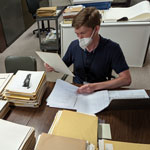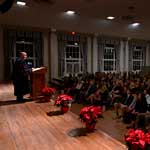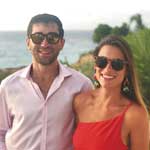
You probably already know Gettysburg College is nationally recognized for its liberal arts program. But did you know it’s also one of the nation’s largest producers of physics majors? According to data released by the American Institute of Physics, Gettysburg College is one of just 74 schools that averaged 10 or more physics bachelor’s degrees per year between 2012-2014. The list comprises schools of all different sizes—including several large universities—that offer a bachelor’s as the highest physics degree. View the full list.
“Our alumni go on to do a variety of things – supporting NASA missions, engineering green spaces for urban areas, working in ophthalmology, running microbreweries, designing full-immersion audio hardware, just to name a few,” said chairperson and W.K.T. Sahm professor in physics, Prof. Sharon Stephenson. "What they all have in common is an appreciation for physics learned within a warm, friendly liberal arts environment, which I believe is the best way to learn physics or any other subject, for that matter.”
We followed up with several physics alumni to learn why they chose Gettysburg, what they learned from their major, and how they’re applying that knowledge today. Read their stories below.
 Alana Allen ’15
Alana Allen ’15
After graduating from Gettysburg, Allen joined Teach For America, a national teacher corps of recent college graduates who commit two years to teach in under-resourced schools. She currently teaches high school physics at People’s Preparatory Charter School, in Newark, New Jersey.
“Interestingly enough, I didn’t take physics at all in high school,” she said.
“In my first year at Gettysburg, I learned about basic physics and physics concepts, and that’s what I emphasize with my students because they can use it in so many classes. And when they get frustrated, I remember being there. It helps me to relate to them as much as I do. Even at Gettysburg, I remember thinking ‘this is too hard,’ but there was always one of my professors there to push me to do more, push me to keep working hard—so I try to do those same things for my students.”

Russell Composto ’82
Composto is the Associate Dean of Undergraduate Education and a professor in the Department of Materials Science and Engineering at the University of Pennsylvania. He returned to Gettysburg to give a lecture on the dispersion of nanorods in polymer nanocomposites, where he shared that as a dean, he specifically looks for engineering students who come from liberal arts schools like Gettysburg.
“A liberal arts education is the way to go at the undergraduate level,” he said. “We don’t know where the future of technology or science is headed, so core skills in the sciences are necessary. A liberal arts education sets you up with a foundation for your career.”
Of his time at Gettysburg Composto shared, “Prof. Richard Mara was the best educator I ever had across the years, including my time at Cornell [for my master’s and PhD]. The enthusiasm he had for the subject matter influenced me to attend graduate school.”
 Tessa Thorsen ’16
Tessa Thorsen ’16
Thorsen was a Mathematics and Physics double major at Gettysburg. In the fall, she will attend the University of Maryland for her Ph.D.
“I am particularly interested in mathematical modeling—using mathematics to model systems, and potentially make predictions or observations from these models,” she said.
Thorsen said she became interested in physics at Gettysburg because she enjoyed learning how to approach and solve problems and apply her classroom learning to the real world.
“Throughout my physics courses, I began to realize that I was fascinated by the mathematics behind the physics, and that by studying applied math I could continue to solve problems and work with real-world situations, but from a mathematical, rather than physical, perspective,” she said. “I loved both my math and my physics courses, so I decided to pursue a graduate education in applied math because I could incorporate both of these fields into my education and research.”
 Michael Booz ’16
Michael Booz ’16
Booz received The Science, Mathematics And Research for Transformation—or SMART—Scholarship for Service. The program awards Booz with a full scholarship as well as career placement upon receiving his master’s in electrical engineering at Rensselaer Polytechnic Institute (RPI).
Booz said that Gettysburg’s focus on developing critical reading and writing skills was instrumental in helping his career.
“Without these skills I would not have been selected for the SMART scholarship program, or have been accepted to RPI for Electrical Engineering,” he said. “The SMART scholarship is a highly competitive scholarship-for-service program funded through the Department of Defense. Following the completion of my degree I will be required to serve as a civilian employee at a location of my choice, and I chose the Naval Undersea Warfare Center, in Newport, RI. I'd also like to mention that working with Prof. Sharon Stephenson on the Gettysburg College Proton Accelerator definitely gave me an edge when applying for the scholarship and grad schools.”


